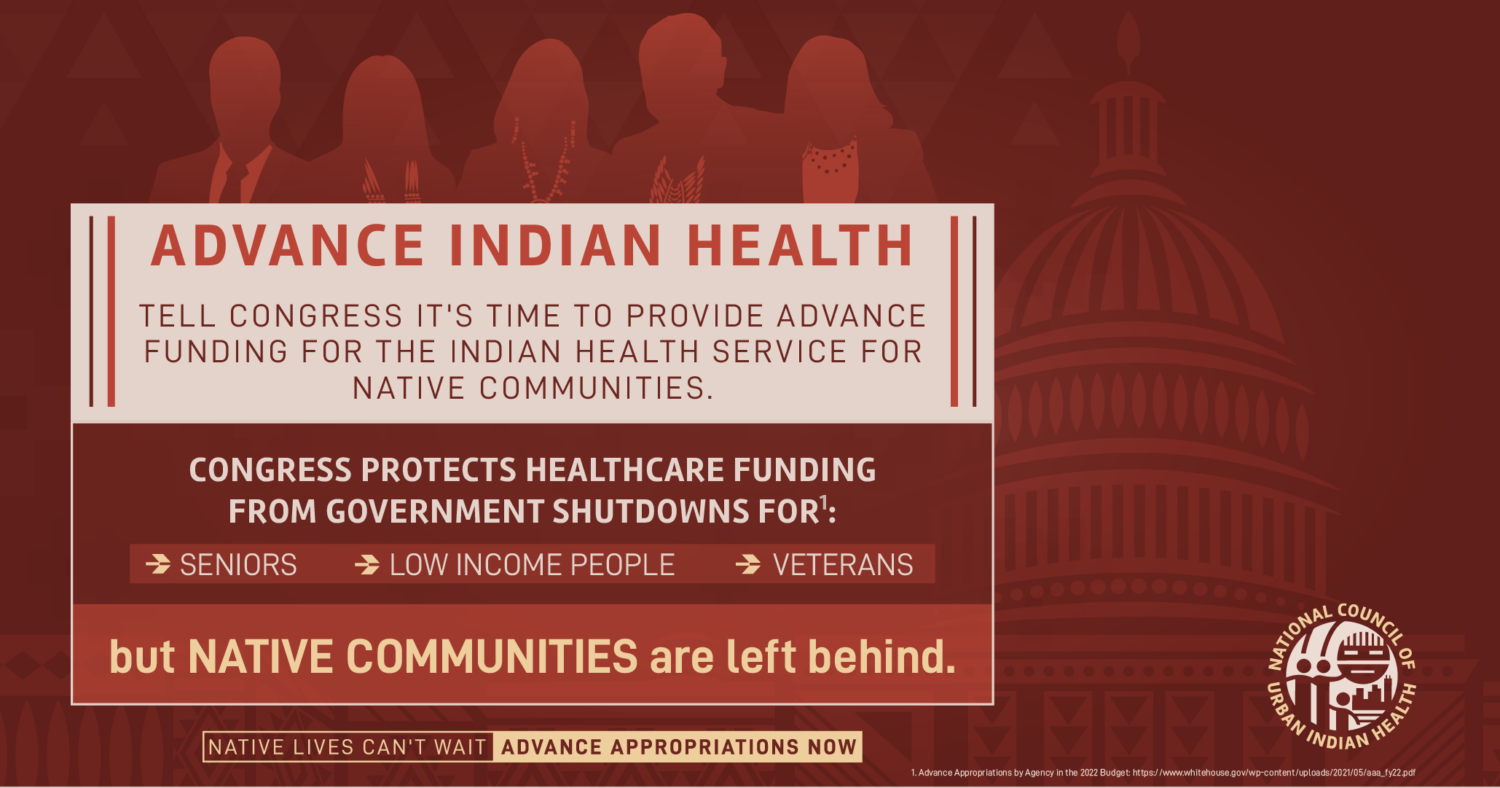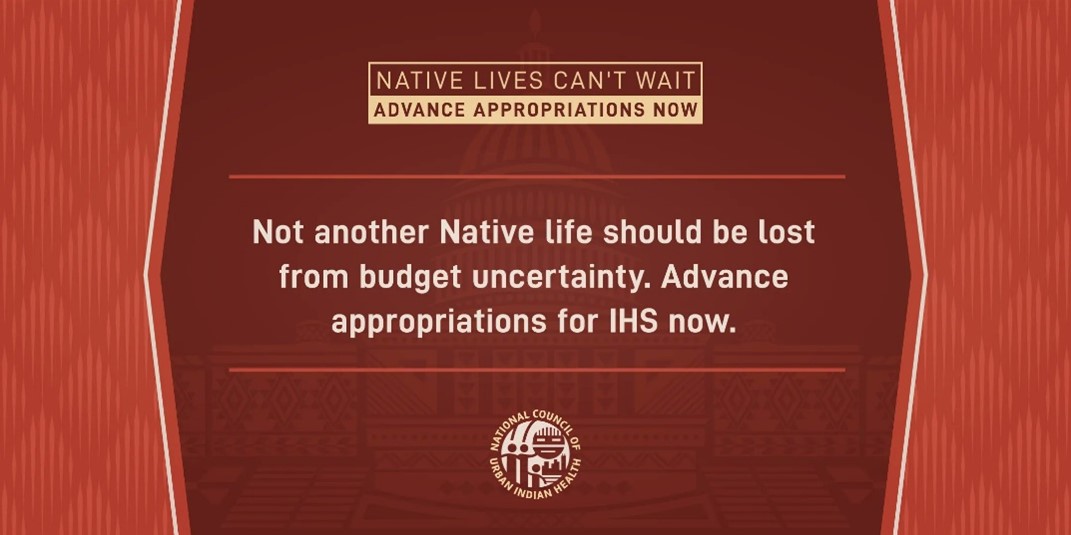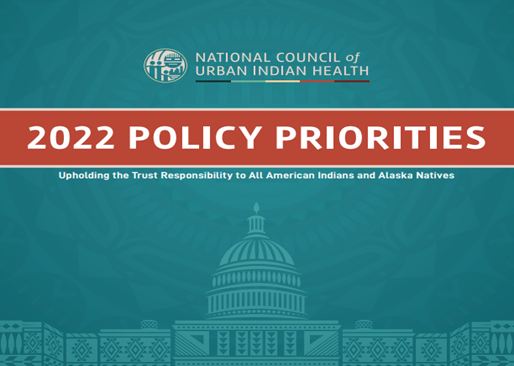On May 10, 2022, The National Council of Urban Indian Health (NCUIH) submitted outside written testimony to the Senate Appropriations Subcommittee on Labor, Health and Human Services, Education, and Related Agencies regarding Fiscal Year (FY) 2023 funding for Urban Indian Organizations (UIOs). NCUIH advocated in its testimony for full funding for the Indian Health Service (IHS) and urban Indian Health and increased resources for Native health programs.
In the testimony, NCUIH requested the following:
- Fully fund IHS at $49.8 billion and Urban Indian Health at $949.9 million for FY23 (as requested by the Tribal Budget Formulation Workgroup)
- Advance appropriations for IHS until mandatory funding is enacted
- Increase funding for Electronic Health Record Modernization
- Increase funding to $30 million for Good Health and Wellness in Indian Country (GHWIC)
- Permanently reauthorize Native Connections (Tribal Behavioral Health Grant)
- Include urban Indians in language for all health programs
- Include UIOs in critical opioid grants
Full Text of Testimony:
National Council of Urban Indian Health – Testimony for Senate LHHS on FY2023 Health and Human Services Appropriations Bill
My name is Francys Crevier, I am Algonquin and the Chief Executive Officer of the National Council of Urban Indian Health (NCUIH). On behalf of NCUIH, the national advocate for health care for the over 70% of American Indians and Alaska Natives (AI/ANs) living off-reservation and the 41 Urban Indian Organizations (UIOs) that serve these populations, I would like to thank Chairwoman Murray, Ranking Member Blunt, and Members of the Subcommittee for the opportunity to submit public witness testimony regarding Fiscal Year (FY) 2023 appropriations. We respectfully request the following:
- Fully fund the Indian Health Service (IHS) at $49.8 billion and Urban Indian Health at $949.9 million for FY23 (as requested by the Tribal Budget Formulation Workgroup)
- Advance appropriations for IHS until mandatory funding is enacted
- Increase funding for Electronic Health Record Modernization
- Increase funding to $30 million for Good Health and Wellness in Indian Country (GHWIC)
- Permanently reauthorize Native Connections (Tribal Behavioral Health Grant)
- Include urban Indians in language for all health programs
- Include UIOs in critical opioid grants
Fully fund the Indian Health Service at $49.8 billion and Urban Indian Health at $949.9 million for FY23 (as requested by the Tribal Budget Formulation Workgroup)
While your leadership was instrumental in providing the greatest investments ever for Indian health and urban Indian health, it is important that we continue in this direction to build on our successes. The average health care spending is around $12,000 per person, however, Tribal and IHS facilities receive only around $4,000 per patient. UIOs receive just $672 per IHS patient – that is only 6 percent of the per capita amount of the national average. That’s what our organizations must work with to provide health care for urban Indian patients.
The federal trust obligation to provide health care to Natives is not optional, and we thus request Congress honor the Tribal Budget Formulation Workgroup (TBFWG) FY23 recommendations of $49.8 billion for IHS and $949.9 million for urban Indian health. That number is much greater than the FY21 enacted amount of $63.7 million, which truly demonstrates how far we have to go to reach the level of need for urban Indian health. At an IHS Area Report meeting where Tribal leaders presented their budget requests, one Oklahoma Tribal leader stated that “There are inadequate levels of funding to address the rising urban Indian population.” Congress must do more to fully fund the IHS in order to improve health outcomes for all Native populations at the amount requested.
In 2018 the Government Accountability Office (GAO-19-74R) reported that from 2013 to 2017, IHS annual spending increased by roughly 18% overall, and roughly 12% per capita. In comparison, annual spending at the Veterans Health Administration (VHA), which has a similar charge to IHS, increased by 32% overall, with a 25% per capita increase during the same period. Similarly, spending under Medicare and Medicaid increased by 22% and 31% respectively. In fact, even though the VHA service population is only three times that of IHS, their annual appropriations are roughly thirteen times higher.
Currently, the entire Eastern seaboard is without any full-ambulatory UIOs due to lack of funding. The IHS has deemed the two remaining UIOs on the East Coast to be outreach and referral only, with a combined less than two-million-dollar budget. Unfortunately, the pandemic has shown that two outreach and referral UIOs to serve all urban Indians on the entire East Coast of the country is a failure to uphold the federal trust obligation. It is evident the UIO line item is insufficient to allow IHS to authorize our East Coast UIOs to open fully operational clinics. Native American Lifelines is actually two programs run in both Boston and Baltimore with an annual budget for both cities of $1.6 million. During the height of the pandemic, that meant Native people living in urban areas on the East Coast had to go back to reservations to get their vaccine to take advantage of the IHS authority that would give them the vaccine early and hopefully not become a mortality statistic.
The federal government owes a trust responsibility to tribes and AI/ANs that is not restricted to the borders of reservations. Funding for Indian health must be significantly increased if the federal government is, to finally, and faithfully, fulfill its trust responsibility.
Advance Appropriations for IHS Until Mandatory Funding Is Enacted
The Indian health system, including IHS, Tribal facilities and UIOs, is the only major federal provider of health care that is funded through annual appropriations. If IHS were to receive mandatory funding or, at the least, advance appropriations, it would not be subject to the harmful effects of government shutdowns, automatic sequestration cuts, and continuing resolutions (CRs). When IHS is funded through a CR, the IHS can only expend funds for the duration of a CR, which prohibits longer term purchases, disrupts the contracts that allow UIOs to provide health care, and quite literally puts lives at risk. Because UIOs must rely on every dollar of limited federal funding they receive to provide critical patient services, any disruption has significant and immediate consequences.
NCUIH supports the President’s proposal in the FY 2023 Budget to fund the IHS through mandatory appropriations and to exempt IHS from proposed law sequestration. The ten years of appropriated mandatory funding in the FY 2023 Budget will ensure predictability that will allow the I/T/U system to engage in long-term and strategic planning. The lack of consistent and clear funding creates significant barriers on the already underfunded IHS system. Until authorizers act to move IHS to mandatory funding, we request that Congress provide advance appropriations to the Indian health system to improve certainty and stability.
Increase funding for Electronic Health Record Modernization
We request your support for the Indian Health Service’s (IHS) transition to a new electronic health record (EHR) system for IHS and UIOs. As EHR modernization moves from planning to fruition, it is vitally important that appropriations continue to increase as appropriate to provide for its success. NCUIH Requests the committee to support this transition with $355.8 million in FY23 appropriations. NCUIH is also supportive of the inclusion of report language suggested by members of Congress in a letter to the House appropriations committee.[1]
CDC: Good Health and Wellness in Indian Country – $30 Million Good Health and Wellness in Indian Country (GHWIC)
The GHWIC program is CDC’s single largest investment in Indian Country. The program funds a total of 27 Tribes, Tribal organizations, and UIOs to improve chronic disease prevention efforts, expand physical activity, and reduce commercial tobacco use. The FY 2023 President’s Budget proposes maintaining at current levels of $22 million. NCUIH requests the Committee support the GHWIC program by increasing funding to $30 million for FY2023.
SAMHSA: Tribal Behavioral Health Grant (Native Connections) – $23.2 Million
The Tribal Behavioral Health Grant (known as Native Connections) is a five-year grant program that helps American Indian and Alaska Native communities identify and address the behavioral health needs of Native youth. The program supports grantees in reducing suicidal behavior and substance use among Native youth up to age 24, easing the impacts of substance use, mental illness, and trauma in tribal communities, and supporting youth as they transition into adulthood.
As of June 2021, SAMHSA had awarded 242 five-year grants to eligible AI/AN entities including UIOs. The program is up for reauthorization in 2022 and the FY23 President’s budget has a request of $23.2 million for the program, an increase of $2.5 million from the FY 2022 Annualized Continuing Resolution. NCUIH requests the committee support addressing the behavioral health needs of our Native communities by reauthorizing this critical program.
Include Urban Indians in Language for All Health Programs
The Declaration of National Indian Health Policy in the Indian Health Care Improvement Act states that: “Congress declares that it is the policy of this Nation, in fulfillment of its special trust responsibilities and legal obligations to Indians to ensure the highest possible health status for Indians and urban Indians and to provide all resources necessary to effect that policy.” In fulfillment of the National Indian Health Policy, the Indian Health Service funds three health programs to provide health care to AI/ANs: IHS sites, tribally operated health programs, and Urban Indian Organizations (referred to as the I/T/U). Unfortunately, this system has been hampered by decades of chronic underfunding. Additionally, while the majority of the Native population resides in urban areas, only 1% of the entire Indian health budget is provided for urban Indian health.
When urban Indians are not specifically mentioned in programmatic language they are most often excluded from participating in such programs. Many programs in the Health and Human Services appropriations bills include language for Indian Tribes and Tribal organizations, but not for urban Indian organizations. Urban Indian Organizations are not considered Tribal organizations, which is a common misconception. Therefore, UIOs must be explicitly included to receive funding. UIOs also do not have access to other IHS line items like IHS and Tribal facilities and do not receive hospitals and health clinics money, purchase and referred care dollars, or IHS dental services dollars, and are not eligible for the IHS facilities fund.
As one advocate stated, “The language everywhere has to include the word ‘urban’ – urban Indian or urban Native. They have to say it, they have to write it and then it’ll reach a critical mass, eventually. Because they don’t get it, you know. We’re just invisible.”[2]
Include UIOs in Critical Opioid Grants
UIOs have repeatedly been left out of funding designed to help AI/AN communities address the opioid crisis. To address the opioid overdose epidemic in Indian Country by increasing access to culturally appropriate and evidence-based treatment, Congress provided funding for Tribal Opioid Response grants. NCUIH has long advocated for UIOs to be added to the Substance Abuse and Mental Health Services Administration’s (SAMHSA) State Opioid Response (SOR) grants given the extent of the impact of the opioid epidemic on all AI/ANs regardless of residence. Since FY 2018, Congress has enacted set asides in opioid response grants to help Native communities address this crisis. However, it was only available for Tribes and Tribal organizations, meaning UIOs working against the same problem are left without the resources necessary to reach the highest health status for all AI/ANs as required of the federal government. This is a failure of equity. Without the necessary funding to address health crises in Indian Country, urban AI/AN people will again be left out of the equation.
Last Spring, Congress introduced the State Opioid Response Grant Authorization Act of 2021 (H.R. 2379), which included a 5 percent set-aside of the funds made available for each fiscal year for Indian Tribes, Tribal organizations, and UIOs to address substance abuse disorders through public health-related activities such as implementing prevention activities, establishing or improving prescription drug monitoring programs, training for health care practitioners, supporting access to health care services, recovery support services, and other activities related to addressing substance use disorders. NCUIH worked closely with Congressional leaders to ensure the inclusion of urban Indians in the funding set-aside outlined in this bill, which eventually passed the House on October 20, 2021. Despite this effort, UIOs were removed from the SOR Grant reauthorization, which saw a $5 million increase (9 percent increase from FY 2021), included in the recently passed FY 2022 Omnibus (H.R. 2471). The final language in the Omnibus only listed “Indian Tribes or Tribal organizations” as eligible and did not use the language from H.R. 2379. When UIOs are not explicitly stated as eligible entities, we are excluded from critical resources and grants, which is a violation of the trust obligation.
We were disappointed to yet again be left out of this key resource as our communities are plagued by the opioid crisis. Inclusion in this program could have enabled UIOs to expand services or workforce or to help address the catastrophic impacts of the opioid epidemic in Indian Country. We urge you to work to ensure funding designated to help AI/AN communities have the proper language to prevent UIOs from lacking access to these critical funds.
Conclusion
These requests are essential to ensure that urban Indians are properly cared for, both during this crisis and in the critical times following. It is the obligation of the United States government to provide these resources for AI/AN people residing in urban areas. This obligation does not disappear in the midst of a pandemic, instead it should be strengthened, as the need in Indian Country is greater than ever. We urge Congress to take this obligation seriously and provide UIOs with all the resources necessary to protect the lives of the entirety of the AI/AN population, regardless of where they live.
[1] https://files.constantcontact.com/a3c45cb9201/562eb81b-dee4-48b8-8519-69bcbebb0ff2.pdf?rdr=true
[2] https://www.usatoday.com/story/news/politics/2022/03/07/opioids-native-americans-funding/9380063002/?gnt-cfr=1



